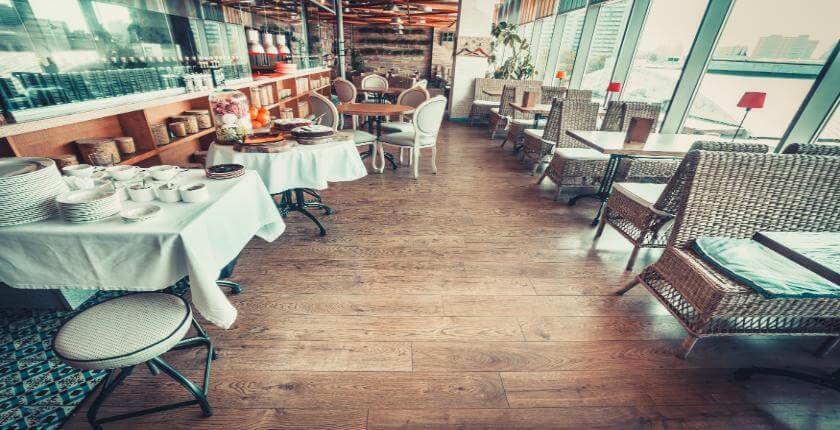
Restaurant Kitchen Flooring
Enquire Today For A Free No Obligation Quote
At Restaurant Kitchen Flooring, we specialise in high-performance flooring systems tailored to meet the operational and hygiene demands of professional restaurant kitchens throughout the UK.
Whether you’re equipping a bustling restaurant, café kitchen, school canteen, or healthcare catering unit, we supply flooring solutions that deliver on safety, hygiene, and long-term durability.
Our systems include anti-slip finishes, resistance to grease and high temperatures, and seamless installations that promote a clean, efficient, and compliant kitchen environment.
What’s the Installation Process for Restaurant Kitchen Floors?
The installation process for restaurant kitchen flooring starts with surface preparation, including shot blasting, grinding, or removal of existing floors. Once the base is ready, we apply a primer layer followed by the selected resin, screed, or vinyl product.
Resin systems are poured, levelled, and cured under controlled conditions. Vinyl flooring is cut to size and heat-welded at the seams to deliver a hygienic, watertight finish.
What Flooring Solutions Are Best Suited for Restaurant Kitchens?
The following best flooring options for restaurant kitchens combine slip resistance, chemical resilience, and hygienic properties, including:
- Polyurethane resin flooring – Seamless and highly resistant to heat, grease, and chemical exposure.
- Epoxy resin flooring – Tough and easy to maintain, ideal for prep zones and high-traffic walkways.
- Commercial kitchen vinyl – Slip-resistant and cost-efficient, suited for areas with lighter footfall.
- Non-slip tiles – Durable and low-maintenance, commonly used in traditional restaurant kitchen layouts.
How Much Does Restaurant Kitchen Flooring Installation Cost?
The cost of restaurant kitchen flooring ranges from £50 to £120+ per square metre, depending on materials used, floor condition, and complexity.
Prices vary by system, epoxy resin costs £55–£80/m², while heavy-duty polyurethane screeds cost £90–£120/m². Additional costs may apply for substrate repair, drainage upgrades, or specialist finishes.
Contact Restaurant Kitchen Flooring for a detailed, tailored quote.
Can Non-Slip and Hygienic Flooring Be Installed in Busy Kitchens?
Non-slip, hygienic flooring is fully achievable in active restaurant kitchens acrosusing textured coatings engineered for wet and greasy conditions.
Seamless resin or welded vinyl installations prevent dirt and bacteria from accumulating in joints. Many systems also feature antimicrobial properties, supporting rigorous cleaning and food hygiene protocols.
Do Flooring Contractors Offer Resin, Vinyl, or Tiled Systems for Kitchens?
Restaurant kitchen flooring contractors offer a full range of systems, including resin floors for durability and hygiene, vinyl floors for fast installation, and ceramic or quarry tiles for traditional aesthetics.
Each system is adaptable to handle operational challenges such as grease spills, heavy catering equipment, or chemical cleaners. We guide clients to the best material based on workflow, compliance needs, and budget.
How Do Installers Across Barking Ensure Flooring Meets Food Safety Standards?
Installers follow strict procedures and industry guidelines to ensure all restaurant kitchen floors meet FSA and HACCP compliance standards.
We use non-porous, easy-to-clean materials and install seamless finishes with proper coving and drainage. Every installation includes technical documentation verifying material performance, food safety compliance, and chemical resistance.
Are Floor Coatings Resistant to Heat, Chemicals, and Grease Build-Up?
Restaurant kitchen floor systems, especially polyurethane resin, are formulated to resist thermal shock, hot oils, grease build-up, and cleaning agents.
Epoxy floors offer excellent wear resistance but are best suited for areas without prolonged high-temperature exposure. Each coating is selected to align with your restaurant’s heat sources, cleaning schedules, and risk zones.
Which Materials Are Most Durable for Kitchen Flooring?
The most durable materials for restaurant kitchen flooring include:
- Polyurethane resin – Withstands extreme heat, fats, and caustic cleaning chemicals; ideal for cooklines and dish areas.
- Epoxy resin – Seamless, durable, and resistant to impact; suited to prep zones and corridors.
- Safety-grade vinyl – Hygienic and anti-slip; budget-friendly choice for low-risk or secondary areas.
How Quickly Can Restaurant Kitchen Flooring Be Replaced or Upgraded?
Restaurant kitchen flooring upgrades can usually be completed within 1 to 3 days, depending on kitchen size, subfloor condition, and system type.
Fast-curing resin systems allow quick turnaround with minimal operational disruption. We schedule installations during off-peak hours or shutdown periods to minimise downtime and ensure full kitchen readiness.
Contact Restaurant Kitchen Flooring to arrange a consultation on system selection, installation planning, and long-term performance.
Find More Info
Make sure you contact us today for a number of great restaurant kitchen flooring services.
For more information on restaurant kitchen flooring, fill in the contact form below to receive a free quote today.
★★★★★
“The new kitchen flooring has completely transformed the safety and cleanliness of our restaurant. It’s durable, non-slip, and looks professional. Couldn’t be happier.”
Lena Foster
Greater London
★★★★★
“We needed a flooring solution that could handle the pace and spills of a busy kitchen. This team delivered exactly that, top-notch quality and quick installation.”
James Rowley
Greater London